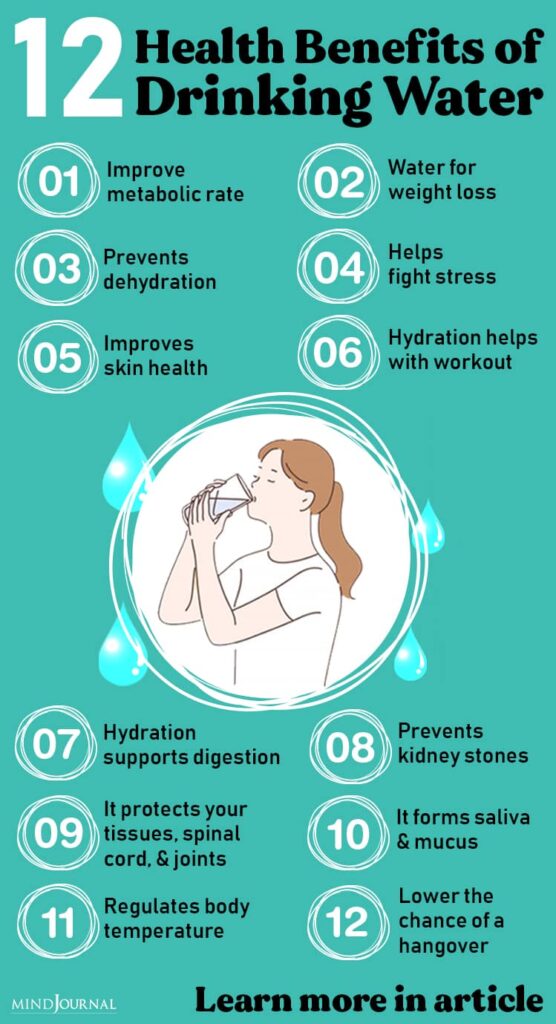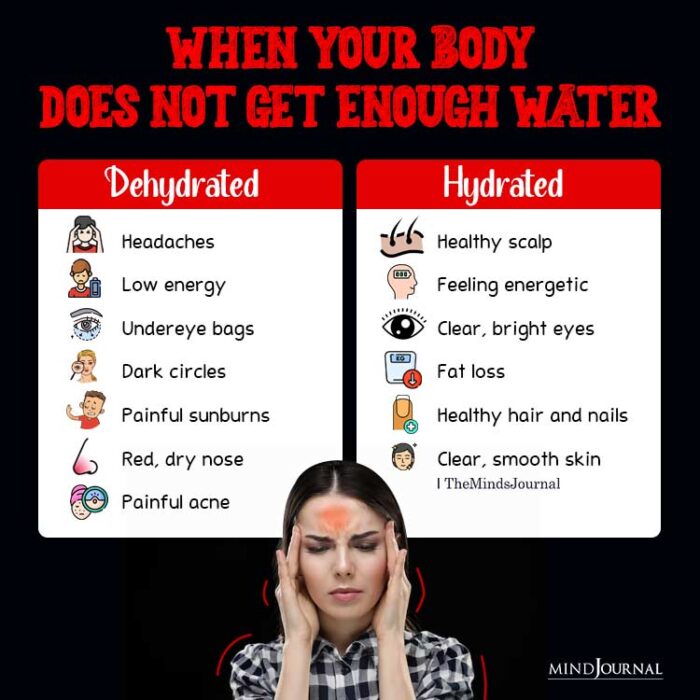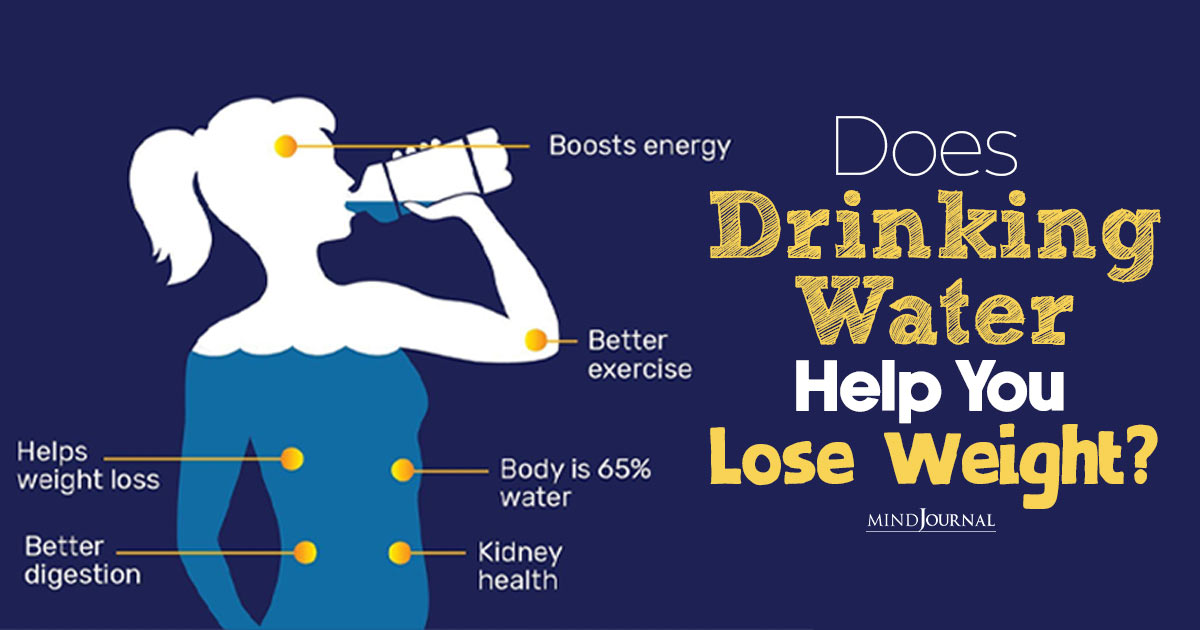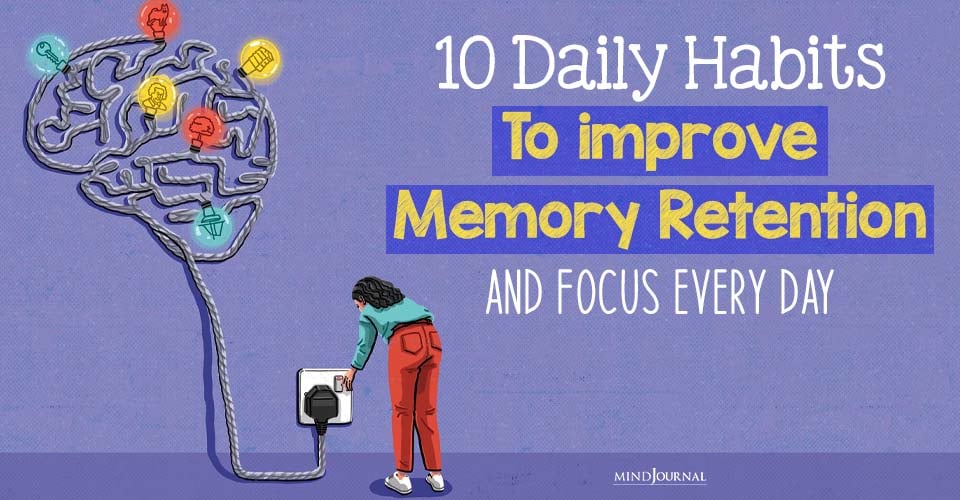Does drinking water help you lose weight? Is this age-old question a myth or is there any truth behind it? Is there any connection between body weight and H2O? Get ready to quench your thirst for knowledge and unlock the secrets to successful weight loss!
Does drinking water help you lose weight?
In the quest for shedding those extra pounds, countless weight loss strategies have emerged throughout the years. Among them, the notion that drinking water can aid in weight loss has gained significant attention.
Related: 12 Health Benefits of Drinking Water
But does drinking water help you lose weight? And if yes, how does water help you lose weight? Grab a glass of water and let’s explore the relationship between drinking water and weight loss –
1. The Calorie-Free Quencher
Water is the ultimate zero-calorie drink, making it an excellent choice for those aiming to lose weight. Unlike sugary beverages or even diet sodas, which can contribute to unwanted calorie intake, water contains no calories, fats, or sugars.
By substituting high-calorie drinks with water, you can effectively reduce your overall calorie consumption, thereby creating a calorie deficit essential for weight loss.
For instance, imagine you usually consume two cans of soda each day, each containing around 150 calories.
By replacing those two sodas with water, you instantly eliminate 300 calories from your daily intake. Over time, this simple switch can lead to noticeable weight loss.

2. Appetite Suppression
Drinking water before meals can act as a natural appetite suppressant. The stomach’s stretch receptors send signals to the brain, indicating fullness when it’s filled with water. This can help curb overeating and reduce calorie intake during meals.
According to a study, participants who drank water before meals experienced a significant reduction in calorie intake compared to those who didn’t.
By consuming water prior to a meal, you create a sense of fullness and satisfaction, leading to reduced portion sizes and ultimately aiding in weight loss. This is the answer to how does water help you lose weight.
3. Increased Metabolic Rate
Your metabolic rate refers to the number of calories your body burns at rest. Interestingly, drinking water has been found to temporarily boost this metabolic rate.
When you consume water, your body works to warm it to match your internal temperature, resulting in a slight increase in energy expenditure.
A study revealed that drinking 500 milliliters of water increased metabolic rate by 30% within ten minutes.
While the effect is temporary, consistently drinking water throughout the day can contribute to a slightly higher calorie burn, supporting your weight loss efforts in the long run.
So does drinking water help you lose weight? It does, but there are several other factors to consider.
4. Hydration and Fat Metabolism
Proper hydration is essential for optimal bodily functions, including fat metabolism. When you’re dehydrated, your body’s ability to break down fat decreases, making weight loss more challenging.
By staying adequately hydrated, you ensure that your body can efficiently utilize stored fat as an energy source.
Moreover, drinking water can aid in the removal of waste products and toxins from the body, promoting overall health and well-being. When your body is functioning optimally, weight loss becomes more achievable.
5. Substituting High-Calorie Drinks
One of the most effective ways to lose weight is by reducing the consumption of high-calorie beverages such as soda, energy drinks, or sugary juices. These beverages not only contribute to weight gain but also lack nutritional value.
By replacing these calorie-laden drinks with water, you eliminate unnecessary sugar and empty calories from your diet. Furthermore, water satisfies your thirst without adding any extra calories, making it an excellent choice for long-term weight management.
6. Improved Digestion
Drinking an adequate amount of water is crucial for maintaining proper digestion. Water helps break down food, aids in nutrient absorption, and prevents constipation.
When your digestive system is functioning optimally, your body can extract essential nutrients efficiently, optimize metabolism, and support weight loss. If you have ever wondered how does water help you lose weight, this is the answer.
Want to know more about does drinking water help you lose weight? Keep reading.
7. Water as a Healthy Snack Alternative
Often, we confuse thirst with hunger, leading to unnecessary snacking and calorie intake. By keeping yourself hydrated throughout the day, you can better differentiate between hunger and thirst signals.
When you feel the urge to snack, try reaching for a glass of water first. It may help satisfy your thirst and reduce unnecessary calorie consumption.
Related: What Is Intermittent Fasting And How It Can Help You Lose Weight
8. Enhanced Exercise Performance
Regular physical activity is vital for weight loss. Staying hydrated during exercise is crucial for maintaining optimal performance and maximizing calorie burn.
Water helps regulate body temperature, lubricate joints, and transport nutrients to muscles. When you’re well-hydrated during workouts, you can push harder, exercise longer, and burn more calories, ultimately aiding in weight loss.
9. Mindful Drinking Habits
Adopting a habit of drinking water throughout the day can promote mindful eating and drinking. By consciously choosing water as your primary beverage, you become more aware of your overall fluid intake and develop healthier habits.
This mindfulness extends to your food choices as well, helping you make better decisions that align with your weight loss goals.

How much water should you drink to lose weight?
Okay, so now we know the answer to the question “Does drinking water help you lose weight?” and “How does water help you lose weight?”. But how much water should you drink to lose weight?
The amount of water you should drink to aid in weight loss can vary depending on factors such as your body size, activity level, and overall health. While there’s clear or specific answer, here are some general guidelines to consider:
1. 8×8 Rule
This is a common guideline that suggests drinking eight 8-ounce glasses of water per day, totaling about 2 liters (64 ounces). However, this guideline is not based on specific scientific evidence and might not be appropriate for everyone.
2. Hydration Needs
The Institute of Medicine recommends a daily water intake of about 3.7 liters (125 ounces) for men and 2.7 liters (91 ounces) for women, including all beverages and foods that contain water. This includes water from fruits, vegetables, and other sources.
3. Individual Needs
Your actual water intake requirements can vary based on factors like your body size, metabolism, physical activity level, climate, and health condition.
For weight loss, it’s generally recommended to aim for higher hydration levels, as adequate water intake can help control appetite and support metabolism.
4. Meal Replacement
Some weight loss plans recommend drinking water before meals to help control hunger and reduce calorie intake. Drinking water before a meal may lead to eating fewer calories because it can create a feeling of fullness.
5. Listen to Your Body
Pay attention to your body’s signals when learning about how much water should you drink to lose weight. Thirst is a natural indicator that you need to drink more water. Additionally, the color of your urine can give you an idea of your hydration level – light yellow to pale straw is generally a good indicator.
6. Physical Activity
If you’re exercising regularly, you’ll need to increase your water intake to account for fluid loss through sweat. Staying hydrated during workouts is important for performance and recovery.
Remember that while drinking water can support weight loss, it’s just one component of a holistic approach. A balanced diet, portion control, regular exercise, and overall healthy lifestyle choices are essential for successful and sustainable weight loss.
To better understand how much water should you drink to lose weight, it’s a good idea to consult with a healthcare professional or a registered dietitian. They can help you determine the right amount of water intake for your individual needs, especially if you have any underlying health conditions.
Drinking excessive amounts of water can also have negative health effects, so it’s important to find the right balance.
Related: Why Do I Always Feel Hungry? 10 Surprising Reasons Behind Your Endless Hunger Pangs
How to stay hydrated throughout the day
Knowing “does drinking water help you lose weight?” and “how much water should you drink to lose weight?” is not enough. We must also know how to drink enough water during the day.
Staying hydrated and drinking enough water throughout the day is essential for maintaining overall health and well-being. Here are some detailed and well-explained tips to help you stay hydrated:
1. Make It a Habit
Consistency is key when it comes to staying hydrated. Make drinking water a daily habit and incorporate it into your routine.
Keep in mind that it takes time to develop a new habit, so be patient with yourself. Eventually, reaching for a glass of water will become second nature.
2. Set a Daily Water Intake Goal
Start by determining how much water you should be drinking each day. While the commonly recommended 8 cups (64 ounces) guideline is a good starting point, individual needs may vary based on factors such as body weight, activity level, and climate.
A general rule of thumb is to aim for around half your body weight (in pounds) in ounces of water per day. For example, if you weigh 150 pounds, your goal would be to drink approximately 75 ounces (2.2 liters) of water daily.
3. Carry a Water Bottle
Consider investing in a reusable water bottle that you can take with you everywhere. Keeping a water bottle handy acts as a continuous prompt to stay hydrated throughout the day.
Choose a bottle that is convenient and easy to carry, whether you prefer a stainless-steel bottle, a BPA-free plastic one, or a glass bottle.
4. Create a Water Drinking Schedule
Establish a water drinking schedule to ensure consistent hydration. Divide your daily water intake goal into manageable increments throughout the day.
For example, if your goal is 75 ounces, aim to drink four 16-ounce glasses of water spread out over the day. Set reminders or use smartphone apps to help you stay on track and meet your hydration goals.
5. Infuse Your Water with Flavor
If you struggle with the taste of plain water, try infusing it with natural flavors. Add slices of lemon, lime, cucumber, or fresh mint leaves to your water bottle to give it a refreshing twist. Not only will it enhance the taste, but it may also encourage you to drink more water.
6. Drink Water with Meals
Make it a habit to drink a glass of water with each meal. Not only does this contribute to your daily water intake, but it also aids in digestion. Sipping water throughout your meal can help you feel fuller and may prevent overeating.
7. Set Hydration Reminders
In our busy lives, it’s easy to forget to drink water. Set reminders on your phone or computer to prompt you to drink water at regular intervals.
This can be especially helpful if you tend to get caught up in work or other activities and neglect your hydration needs.

8. Monitor Your Urine Color
The color of your urine can indicate your hydration level. Aim for a pale yellow or straw-like color for optimal hydration. If it’s darker, it’s an indication that you need to drink more water.
Aim to keep your urine color within the healthy range as a general guideline for staying adequately hydrated.
9. Eat Hydrating Foods
Remember that staying hydrated is not just about drinking water; it’s also about consuming foods with high water content. Include hydrating foods in your diet, such as watermelon, cucumbers, oranges, strawberries, tomatoes, and leafy greens.
Such foods provide hydration along with essential nutrients to improve your overall health.
Remember, staying hydrated is crucial for optimal bodily functions, energy levels, and overall health. By following these tips and incorporating them into your daily routine, you can ensure that you’re drinking enough water throughout the day and reaping the benefits of proper hydration. Cheers to a hydrated and healthier you!
Related: Beyond The Scale: Exploring Yo-Yo Dieting Meaning, Dangers And How To Stop
Takeaway
So does drinking water help you lose weight? Although water alone won’t cause instant weight loss, it can significantly aid and complement your weight loss efforts.
By substituting high-calorie beverages, suppressing appetite, boosting metabolism, and promoting overall health, water plays a crucial role in creating a calorie deficit and optimizing bodily functions for weight loss.
Remember, weight loss is a holistic process that requires a balanced diet, regular physical activity, and healthy lifestyle choices.
Drinking water is just one piece of the puzzle, but an important one nonetheless. So, raise your glass and toast to good health and successful weight loss!
Keep in mind that individual needs may vary, and it’s always a good idea to consult with a healthcare professional or registered dietitian to develop a personalized weight loss plan that suits your specific needs and goals.
Here’s to a hydrated, healthier, and happier you!
Did you enjoy reading our article – Does drinking water help you lose weight? Comment and let us know!
Frequently Asked Questions (FAQs):
Does drinking water help lose fat?
Yes, drinking water can aid weight loss by promoting fullness, boosting metabolism, and aiding digestion, but it’s not a sole solution.
Is lemon water good for weight loss?
Lemon water may slightly aid weight loss by hydrating and promoting fullness, but it’s not a major factor on its own.
Can taking honey before bed help in weight loss?
There’s no substantial evidence that honey before bed specifically aids weight loss; overall diet and lifestyle are more important.










Leave a Reply